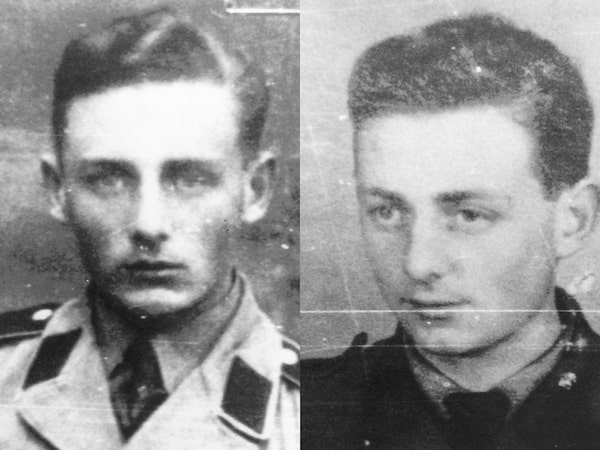
Wartime photos of Helmut Oberlander, an Ontario man that the federal government has tried for 25 year to deport out of Canada because he worked as an interpreter for a German death squad during the Second World War.Ontario Jewish Archives
A quarter of a century ago, two RCMP officers showed up at Helmut Oberlander’s home in Waterloo, Ont., to ask about how he immigrated from Germany and what he did during the Second World War.
That visit, on Jan. 25, 1995, signalled the start of Ottawa’s efforts to deport Mr. Oberlander, who had been an interpreter for a German death squad during the invasion of the Soviet Union.
He was among the first targeted under a new federal strategy of stripping Nazi-era suspects of their Canadian citizenship, then expelling them. He is now the last remaining removal case linked to Second World War atrocities.
He says he was conscripted and there is no evidence he ever pulled a trigger. But the Federal Court ruled that his work as an interpreter contributed to his unit’s murderous aims and that he shouldn’t have been allowed into Canada in the first place.
For 25 years, he waged a protracted legal battle.
On Monday, having run out of avenues of judicial appeals, the former real estate developer, now 96, will have his case reviewed for the first time by the Immigration and Refugee Board, which could order him deported.
“People like Oberlander are a good example that if you are prepared to litigate every single step along the way, and take every legal option, it just never ends,” David Matas, counsel to the League for Human Rights of B’nai Brith Canada, said in an interview.
In the words of Alti Rodal, who was director of historical research for the Deschênes Commission, which looked into the country’s handling of fugitive Nazis, “Canada started too late, moved too haltingly and did too little.”
Justice Department spokesman Ian McLeod said that most of the cases undertaken by the government resulted in a citizenship revocation.
However, most of those men still remained and died in Canada. In addition to Mr. Oberlander, since 1995 Ottawa has initiated 19 deportation cases against Second World War suspects. Only one man was extradited and two left on their own.
Eleven others died of old age before proceedings ended. Ottawa lost in court in three cases. In two files, the courts ruled in favour of the government but the federal cabinet then wouldn’t proceed further.
Mr. Oberlander immigrated to Canada in 1954. Around that time, Canada was easing its controls on admitting people with ties to wartime Germany, Ms. Rodal said. “The main motivator was that ‘Nazism is defeated, it’s no longer a threat. We have to be concerned about communism,’ ” she said.
The hands-off approach carried into the 1970s. Pierre Trudeau conceded at a 1987 conference that his government did little, believing that Nazi crimes were a problem “of previous times.”
Mr. Oberlander had been questioned in 1970 by West German officials. He said he didn’t witness any killings and didn’t know he was in a death squad. “Our unit had something to do with the administration of Eastern regions,” he said.
Ottawa started the process to remove him 50 years after the war ended. However, officials heard allegations against him decades before, according to archival records released through access to information requests.
The documents show that in 1963 the RCMP was told a Soviet magazine claimed that a Helmut Oberlander living in Canada had participated in mass killings.
An ethnic German born in the Soviet Union, Mr. Oberlander was 17 when he became an interpreter for Einsatzkommando 10a, which massacred 20,000 victims between 1941 and 1943.
In the 1960s, seven former EK10a members gave West German investigators ghastly accounts of mass executions and mentioned that Mr. Oberlander was an interpreter.
In one, Leo Maar described a day in Rostov when a group of Jews had to undress and hand over their jewellery, then were taken away by trucks.
“We were just about to close up the box containing the valuables when Oberlander, the interpreter that I knew, came into our room with a girl 19 or 20 years of age who still had her clothes on,” Mr. Maar said in 1966.
The woman cried and said she wasn’t Jewish. “[An officer] then also came in, had Oberlander question her and translate for her that she could go home.”
Canadian officials felt there wasn’t enough evidence to charge Mr. Oberlander.
But his fate turned when Canada’s Supreme Court upheld the acquittal of Imre Finta, who had helped the Nazis deport Hungarian Jews.
The court’s 1994 ruling allowed the legal defence that Mr. Finta mistakenly believed his orders were lawful. That made prosecuting war criminals nearly impossible.
Amending the Criminal Code would take time. With the suspects being so old, Ottawa decided it would be faster to revoke citizenship and deport.
Mr. Oberlander now fit into that new approach. Proceedings began against him and two others in 1995.
Mr. Oberlander’s citizenship was revoked three times and each time he got a judicial review to send the decision back to be reconsidered. He is now at the IRB after being unable to overturn the fourth revocation.
“[Mr. Oberlander’s] work as an interpreter facilitated the screening process for executions and served an important step towards the realization of Ek10a’s criminal purpose,” Justice Michael Phelan concluded in a 2018 decision that upheld rescinding his citizenship.
“If we knew then what we know now, we would have been more aggressive … what we did was a weak substitution for prosecution,” a high-ranking federal official recalled in an interview with The Globe and Mail.
It is unclear how long the IRB proceedings will take. But it is likely he will be in Canada when he turns 97, on Feb. 15.
Our Morning Update and Evening Update newsletters are written by Globe editors, giving you a concise summary of the day’s most important headlines. Sign up today.